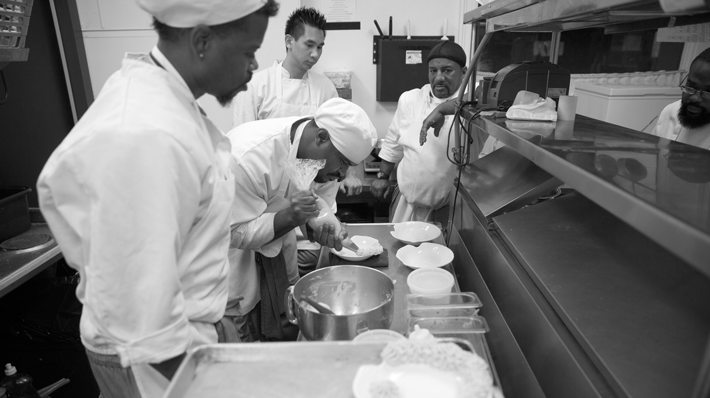A group of new students—men and women, all ages, mostly African-American—are sprawled over tables in one corner, being quizzed on French culinary terms. At the opposite end of the room, a group is tasting Spanish sherries, learning to distinguish dry amontillados from sweet muscatels. In the basement, young men are cutting eggplant, stuffing it with tomato slices, and tying it with kitchen twine for roasting. Every inch of the restaurant is full of students taking notes, lugging supplies, stirring, pouring, chopping, slicing. They have one thing in common: they all spent time in jail.
This is Edwins, a white-linen classical French restaurant in Cleveland that teaches culinary skills to ex-convicts and serves haute cuisine to patrons. This restaurant began in a Detroit courthouse, where Brandon Chrostowski was facing ten years for drug possession and fleeing the scene of a crime. Instead of jail, the judge decided to give the 19-year-old a break if he found a job and stayed out of trouble. Chrostowski found that job in the food business, and discovered that he loved the breakneck activity of a serious restaurant. Eventually he was taken under the wing of a mentor chef who pushed the young man to continue his education at culinary school. Brandon went on to train with culinary lions in America and France, and worked at some of the top French restaurants in the U.S.

With this experience, Chrostowski moved to Cleveland in 2007 and founded Edwins Leadership and Restaurant Institute, with the goal of giving ex-prisoners the same kind of life-transforming break he got. The first Edwins program (the name stands for “Education Wins”) was simply Chrostowski dragging his knives, bowls, and mini-blowtorches into Ohio prisons to teach the basics of French cuisine. Today, his “Culinary Clubs” have expanded to 14 of the 28 state prisons in Ohio.
Those in-prison programs paved the way for the restaurant, which opened in 2013. At Edwins, three staggered cohorts of students, all ex-prisoners, take a six-month course designed to teach them every aspect of working in a high-concept French eatery. The first two weeks are a boot camp for basic skills: time management, food handling, sanitation, basic math, and customer service. The program is intense, hard, demanding—“because that’s how we test commitment,” says culinary director Gerry Grim. The group I saw being quizzed on French terms was just nine days into the program, and of 51 enrollees who started, only 32 remained.
From the classroom, the program moves to the prep room, the line, the sauce station, the dessert cart, the bar, and tableside. Once students complete the rotation, they are directed to local kitchens; the employment rate within 30 days of graduation tops 98 percent. More importantly the recidivism rate among Edwins alumni is startlingly low—of 185 graduates since November 2013, only two have re-offended.
The food at Edwins is sophisticated, the experience refined—by choice. “We could teach students how to make burgers, but why not teach to the top?” asks education director Jon Khanna. “We’re going to give them the tools to work at the best restaurants. If they have the desire, they could end up at a place like this” and make the highest salaries the culinary world provides. Most will end up at more downscale restaurants or in food service, but that’s okay, says Khanna. “The point is to know that you can do anything, and then find your place.”
Being able to do anything means Edwins students taste good wines (a new experience for many), sample unfamiliar foods like rabbit, escargot, and foie gras, and master enough French to know what they’re offering in the “assiette de charcuteries maison.” During dinner service to paying guests, instructors mingle among the students, watching for problems, but intervening only to “prevent disasters,” says Grim. “We work hard to ensure that the food is right. People will come once for the mission, but they won’t come back if the food’s not good.”
Given the refined dining experience at Edwins, the pandemonium in the kitchen and downstairs is startling. The tumult reveals exactly how, and why, this program works. For the instructors at Edwins aren’t simply transmitting technical skills. They’re aggressively involved in transforming the habits, expectations, and desires of their students—in short, changing their lives.

“The life skills we have to teach, it runs the gamut,” says Grim. We’re sitting in his “office”—a desk shoved up against a basement wall in a room that also serves as a classroom and hallway. As we talk, “Mark,” a skinny young man with tattoos and an endearing grin, is prepping a pile of lobster tails.
“We give students a questionnaire to get out in front of problems before they blow up. Like Mark here,” he says, pointing. “We found out he doesn’t have a driver’s license. So we went and got him a permit yesterday. I’m not sure who’s going to teach him, though. Maybe we’ll find a big f*****g parking lot…” he trails off, laughing; Mark blushes.
“You got a checking account this week, right?” Mark nods. Grim turns back to me. “See, we try to get ahead of these problems. For a lot of students, it’s a birth certificate—they’ve never had one, so they can’t get an ID, can’t get a bank account, can’t fill out a W-9, can’t work. So we say, you’re here for six months, let’s get that rolling.”
Grim continues talking, but stops suddenly when another young man walks by on his way to the tiny changing room next door. The man was fresh from a child-support modification hearing. “So you’re out, you didn’t go to jail, right?” Grim calls out. “Well, for now,” the man replies in a thick northeast Ohio accent. “But I got to go back in October and start making some payments.”
“Well, how much? How much money you got to pay to stay out?”
“$32.82 a month. Don’t know where I get that.”
“Ok, well, that’s fine, we’ll f*****g figure something out. Go find Tyrone and get busy, I did half your work today anyway. Make sure I didn’t mess anything up.” Grim laughs, rocking back in his chair.
This commitment to bulldozing through every obstacle that stands in the way of students’ gainful employment, self-sufficiency, and self-respect wasn’t part of the original plan at Edwins. Instead, it happened organically as the instructors realized they couldn’t make the job training stick if they didn’t help students address all the logistical arrangements that overwhelm many ex-prisoners.
So besides the instructional staff, Edwins has a full-time caseworker who helps with child care (a huge challenge for many students), transportation, medical needs, clothing, resolving back taxes, and custody modifications. Recently, an attorney was brought on part-time to help students deal with outstanding warrants, bail hearings, child-support hearings and modifications, identity theft (a surprisingly common problem for the incarcerated), and other legal issues.
Edwins has its own residence for students, staffed by a full-time supervisor who makes sure everyone stays sober and out of trouble. The apartment building was purchased after instructors realized that inconsistent housing arrangements were a serious obstacle to student success. Staffers would hear on a regular basis, “I’m sorry I’m late, but I’m sleeping in my car,” or “I’m sleeping in a shelter and somebody stole all my stuff.” The program offers housing for alumni as well. And it runs a thrift store so that students and graduates can pick out low-cost clothing, kitchenware, or appliances.
Recently, Edwins purchased an abandoned warehouse. Once funding is secured it plans to build a butcher shop, bakery, cheese shop, and fishmonger there. This will provide additional training for students and cut the cost of the restaurant’s staples.
Edwins has done all this without taking any government money. The program subsists on private donations and receipts from the restaurant. Early supporters of the effort were the Saint Luke’s Foundation, the United Black Fund of Greater Cleveland, and the Char and Chuck Fowler Family Foundation.
From jail to jobs
Edwins isn’t the only group using food preparation to give strugglers a chance to restart their lives within society. In Seattle, FareStart employs and trains the homeless in food preparation. Fully 70 percent of the homeless people it takes into its culinary program are employed a year later. In 2010 FareStart began exporting its winning recipe to other cities, and now leads a network of 60 member operations who operate by similar principles all across the nation.
Other groups are training ex-offenders in the entrepreneurial arts (where a significant number of offenders have gifts). Operation of a small business can improve character and build useful habits at the same time that it provides a living. Nonprofits like Prison Entrepreneurship Program and Defy Ventures have found that when they have supportive volunteer business mentors, many ex-offenders can succeed in self-employment. Six companies launched by graduates of PEP already gross $1 million or more annually. At Defy, recidivism for those who enroll in its program is less than 5 percent. At a Bay-area program called The Last Mile, tech companies “outsource” computer coding tasks into San Quentin state prison. When participants are released, they graduate into paid internships, and then jobs.
Other groups have zeroed in on the job-search process, aiding with interview preparation, résumé building, and the spotting of opportunities in job markets. In Houston, WorkFaith Connection operates an intensive eight-day bootcamp. In Chicago, the Cara program has developed in-house businesses that provide transitional employment opportunities—a chance for those needing job experience to learn how to work regularly and well, with a path from there to permanent employment. A similar strategy is employed in New York City by the Doe Fund.
Several nonprofits have built up substantial in-house businesses (“social enterprises”) because they’ve found that the first job for an ex-offender after his release is the hardest task and biggest risk. With some time in a protected job and supportive environment, many former convicts can transition successfully to the open job market. In addition to those leaving prison, these organizations often use the same strategies with individuals who have been homeless, addicted, or unemployed for years.
When Nancy Kohlberg of the Kohlberg Foundation decided to focus on ex-offenders, she built off successes the foundation had previously had in serving veterans. She zeroed in on three prisons in her immediate region so the foundation could monitor closely (in her late 80s, she still visits the local prisons in person). Her group discovered that a sure-fire way to prepare inmates for gainful employment is to train them for the restaurant business. Those who complete training programs in this vein generally have a job within a couple weeks of getting out. With some inmates, preparing them for college while they are still locked up is effective. Partnering with nonprofits like Hudson Link for Higher Education in Prison, the Bard Prison Initiative, and Marymount Manhattan College Bedford Hills, recidivism rates have sometimes been reduced to under 5 percent, versus more than 40 percent for other ex-cons.
Another area where Kohlberg has invested is transitional housing. Many individuals leaving prison need a new place to get started, away from the people and environment where their criminal life started. Through Hudson Link, Exodus, and Getting Out and Staying Out, the foundation has been able to fund temporary housing and mentoring support to those starting afresh.
“It’s very practical work,” says Nancy McCabe, executive director of the Kohlberg Foundation. “It’s about getting people who are coming out to become productive, taxpaying, employed citizens, who are reunited with their families quickly.”
Not by bread alone
The largest nonprofit aiming to redeem ex-offenders works mostly from the inside—inside of prisons, and inside of people. Prison Fellowship draws on churches for over 11,000 volunteers who mentor prisoners and support left-behind family members. For those behind bars, Prison Fellowship offers Bible studies and life-skills classes at 428 prisons across the country, plus assistance and mentoring upon re-entry to freedom. Its Angel Tree program and other efforts minister to children on behalf of parents who are locked up.
A cornerstone of the Prison Fellowship ministry is the Academy—an intensive mentoring and discipleship program taught by Prison Fellowship staff and trained volunteers. Prisoners apply to join the Academy, which includes Bible study, group discussions, instruction on the consequences of criminal acts and the need to accept personal responsibility, and help with breaking cycles of drug and alcohol addiction. The Academy also aims to help prisoners to improve the relationship skills they will need in work, family life, and social interactions. Once they are released, Academy graduates continue to get ongoing mentoring, and support like addiction counseling.
The Academies are open to all faiths or persons of no faith, but they are unabashedly Christian, and Academy participants will hear the Gospel message. “There’s no recipe for transformation, but we are a Christian nonprofit, and we believe transformation happens at the foot of the cross,” says president James Ackerman, who came on board to lead the organization in 2016. “And so we present to prisoners a perspective on life that may be different from the one they’ve been living. We teach that you are valuable, you have God-given potential, and God has a plan for your life. In the end, the individual has to commit to living in a different way.”
After the death of its charismatic founder Chuck Colson in 2012, many believed Prison Fellowship had lost its focus. Too many disconnected programs, veering away from the core mission of serving prisoners. Ackerman, the man selected to get things back on track, was a media executive and longtime Prison Fellowship volunteer, but his route to his current position was anything but conventional.
The son of a sitcom-producer father and an actor mother, he had no set plans after high school, and ended up enlisting in the Coast Guard. Ackerman was stunned when a “pretty wild” close friend suddenly moved out of their shared quarters and became a practicing Christian. He began attending church with his old roommate, which put him on a track to his own conversion.
Ackerman went on to work at media companies, became an executive, and ended up heading several different media ventures. But he was “always on the road. I was neglecting my marriage, my time as a father, my time in my community, my friendships.” On a retreat with his son he met a Prison Fellowship director who invited him to visit a prison where the group sponsored a year-long program. Those inmates lived in an orderly, calm environment—entirely different from the disorder and hostility in other wings of the same prison.
After that visit, Ackerman began working as a mentor at a maximum-security prison near Nashville. He taught résumé writing, budgeting, and interview skills to prisoners preparing to be released, and began a years-long relationship with a violent criminal named Terrence who had become a committed Christian. “You know that kind of euphoric feeling that you get when you walk into a resort for the first time and see the beautiful ocean? I have that reaction when I’m in a prison. Peace—like I’m in a place where I belong.”
Ackerman aims to expand the Academies operated by Prison Fellowship from 78 branches in 26 states at present to at least 172 nationwide. To prepare for that growth, Prison Fellowship staff are standardizing curricula and forming links to complementary programs like Celebrate Recovery, a Christian 12-step program. Prison Fellowship will rely on foundation and donor support to fuel these wider efforts. The program accepts no government funding.
This year, Prison Fellowship hired a director of program assessment, charged with working with universities to develop statewide studies of the effectiveness of its programs. Ackerman is confident that data will confirm what Prison Fellowship’s volunteers know anecdotally: that inner change supported by religious teaching can transform outer behavior.
If they succeed, individual men and women, and society as a whole, will both benefit. Ackerman has high hopes. “We want to see prison populations fall. We want to see recidivism take a nosedive. We want communities to become safer.”
Justin Torres was a contributing editor to Philanthropy.
